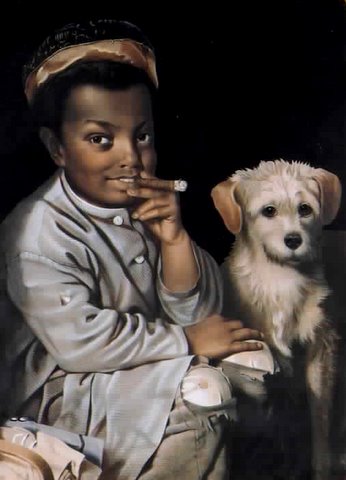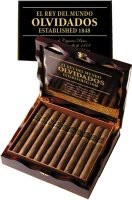|

Cigars,
Memories of Dad and Regret
By J. Conrad Guest
I turn fifty-three next month, and a week later my mother and father celebrate their
birthdays—well, they would have had they lived. They were born on the same day but ten years apart. My dad never forgot
Mom’s birthday. He’d be ninety-one, she, eighty-one.
I sit here this morning smoking a Partagas 1845—a delicious
smoke—thinking about Dad. This cigar thing: it started out as an occasional indulgence, a couple times a month, often
in celebration of some small publishing success. But this cigar thing, it has grown from an occasional indulgence to a habit.
An addiction? I don’t think so, at least not a physical dependence. I went a couple weeks without lighting up this summer
past and felt no withdrawal. Not like coffee. I go without coffee in the morning and I’m guaranteed a caffeine withdrawal
headache that will go right out the top of my head.
But cigars have become an integral part of my writing routine.
Coffee and a cigar on Sunday morning: my muses without whom I would sit and stare at a blank screen. It’s all about
the routine.
I recall my dad smoking a cigar with Sgt. Major Bean, his lifetime
friend from the Marine Corps. Bean found his métier in the Corps; Dad spent eight
years as a Marine. He became a civilian at his mother’s urging. They—Bean and my father—shared something
I would never know. Whatever my dad did on Okinawa, the horrors of war I saw depicted in Saving
Private War, read about in Flags of Our Fathers and With the Old Breed, he never shared with me.
I met Bean a handful of times in my youth. He was larger than
life, colorful. Everything they depict in Hollywood movies about World War II. He stayed with us for a few days to attend
a Marine reunion in Detroit when I was nine or ten. I gave up my bed and slept on the floor in the living room. I recall my
mother marveling over how well he made up the bed in the morning. Yeah. You could bounce a quarter off the top sheet.
Dad and Bean fired up cigars one night on our back patio.
I have no idea what they smoked, although this was after the Cuban embargo. I imagine today they were good smokes. Bean, I
don’t believe, would indulge in cheap stogies.
But I didn’t pay much heed to their cigars. My dad smoked
cigarettes, so cigars weren’t such a far cry from cigarettes. I was taken more with the bottle of tequila they finished
between them, and the tiny worm that floated at the bottom of the bottle; they cut it in half and ate it. Bean became livelier,
louder, the more he drank. My dad, maybe wishing to set an example for his son, perhaps for other reasons I’ll never
know, became more reserved.
I saw Bean maybe twice more, the last time when I was seventeen.
The years went by; Bean died of AIDS the result of having been given HIV tainted blood during heart surgery; Dad passed away
in 1998. Two years later a friend who is no longer a friend, and that’s a good thing, introduced me to cigars. Mom,
who had preceded Dad to that other plane of existence by a year, would not have approved.
Sadly I never got to enjoy a cigar with my dad and I regret that,
a minor regret compared to other, heavier regrets I carry with me. Still, I occasionally light one up thinking of him: always
on Father’s Day and on the anniversary of his death, usually accompanied by a glass of scotch. The good stuff. But then,
I can’t recall the last time I had a bottle of Dewar’s in the house.
I’ve been told I need to let go of him, and Mom. But really,
is it so wrong to give a nod to one’s parents a few times a year? Mother’s Day, Father’s Day, are they only
for parents who still walk the planet? Lamenting their loss, continuing to grieve for them is not healthy; but should we ever
forget a loved one after their loss? I don’t think so. I’m not sure it’s even possible.
I’ve written non-fiction and creative non-fiction around
each of them. Parts of them show up in my fiction; my effort, I suppose, to keep them alive. I find it therapeutic, writing
about them, and more often than not I come away from the experience having learned something. Sometimes about them; other
times about myself. That’s a good thing.
~~~~~~~~~~~~~~~~~~~~~~~~~~~~~~~~~~~~~~~~~~~~~~~~~~~~~~~~~~~~~~~~~~
Desert Smoke
By Allen Taylor
I hated being there. But the finest moments spent in the desert were smoking cigars with the two other captains
in my section, Steve Dinesco and Robert Toms.
One doesn’t think of a battlefield as a place for cigars and parlor room conversation, but we were
princes of Arabian nights, stuck in the one place we’d have never chosen for ourselves but making the most of it. Popping
cherries became a nightly ritual when battlefield business didn’t command our attention.
Dinesco was the battalion’s assistant operations officer. A closeted and staunch advocate of homosexual
rights, he was tall and buff, a hard authoritarian with a soft leathery side that triggered the rumor mill.
Toms, a tall slim man with puffy lips, and I were battle captains
working 12-hour shifts with mutual hand-offs.
We’d wait until dark and the field grades had retired to their quarters. The night crews had all
checked out for the evening and the battalion operations center began to quiet down. Then we’d step out front of the
TOC—tactical operations center—and light a smoke. It was the perfect way to unwind even though one of us—usually
Toms—was officially on duty. They were peaceful moments.
Al Anbar. The province was hardly a hotbed of peace. Across the road from us we’d hear nightly battle
fire—the shrill of M-60s and almost weekly rocket attacks. Occasionally, one of them would climb up the hill and land
on the airfield we were protecting. The closest call hit just 100 feet from the stone building in which we worked. I was glad
at the time to have been inside, although I could have sworn a fissure was about to open up at my feet and swallow me whole.
I’d have given anything for a Cuban that night.
The memories of a good smoke and good conversation stick around forever, like a bad smell or a favorite
song. Dinesco loved to prove himself the capable officer. Toms and I were more of the don’t-give-a-fuck variety. Toms
had reason not to care; no one liked him and he was as competent as a cheap stogie. Me, I was pissed off to know that I was
an accomplice in a war that just felt wrong, biding my time like a bad smoke.
I finally got a chance to peer into the real Dinesco one night when the battalion operations officer, Major
Richard Hawkes, was gone on R&R. Dinesco shared with us private conversations he’d had with the battalion commander.
He made it sound like the commander was encouraging him to seek advancement into a more rewarding position. It was certainly
an opportunity Dinesco would have welcomed. Toms too, though he’d have never lit the tip of any task he’d been
given. I’d have turned it down just for the hell of it—and once did (a company commander’s position).
Dinesco made me laugh. “I’ll make an end run around that motherfucker.”
He meant his boss. It was the kind of man Dinesco was. If he couldn’t befriend you, he’d puff
you out. And that’s why I felt then, and feel even more now, that I was in the wrong place. The military breeds scoundrels.
And only the scoundrels win.
But you don’t have to be a scoundrel to enjoy a good cigar.
~~~~~~~~~~~~~~~~~~~~~~~~~~~~~~~~~~~~~~~~~~~~~~~~~~~~~~~~~~~~~~~~~~
Allen Taylor is an Iraq War veteran.
He resigned his commission in December 2005 after 12 years of military service. He has been writing poetry for 20 years. His
poem “Cigar” was published in New Verse News. He writes the World Class
Poetry Blog at http://www.worldclasspoetryblog.com and is webmaster at http://www.world-class-poetry.com. His Twitter name is @WorldClassPoet.
~~~~~~~~~~~~~~~~~~~~~~~~~~~~~~~~~~~~~~~~~~~~~~~~~~~~~~~~~~~~~~~~~~

One Unforgettable
Smoke: El Rey Del Mundo Olvidados
Cigar Review by J.
Conrad Guest
A few weeks ago, after I’d finished lunch, I lit up an Olvidados robusto and
headed out for a walk to pick up my mail. In my complex all the mailboxes are located near the entrance.
About halfway there a couple of young boys on skateboards came
past me from the other direction. One of them looked at me — I’d just exhaled a plume of smoke — and told
me, “You can’t smoke that!” To which I replied, “Why not?” “Because they’re not
good for you!” he advised me knowledgeably.
Well, at this point I asked the kid how old he was and when he
said that he was fourteen, I told him he shouldn’t be skateboarding without a helmet.
I chuckled and went on my way, enjoying the robusto and thinking
that a lot of people have tried to tell me what I should and shouldn’t do over the years and I’m going to start
listening to a fourteen-year-old kid? Nah. Chances are he’s going to outlive me anyway, even if he doesn’t wear
a helmet while skateboarding. I never did when I was his age.
But getting back to the Olvidados. Translated, it means “the
forgotten ones.”
Handmade at General Cigar’s Honduras American Tobacco South
America, the Olvidados is purportedly the strongest blend the factory produces. Made with a Connecticut broadleaf binder and
an aged blend of Nicaraguan ligero, Honduran viso and Dominican seco filler tobaccos, the result is a cigar reminiscent of
a true Cuban, before the embargo and before the previous administration made it illegal for an American to smoke a Cuban anywhere
in the world. Schwarzenegger found out how long the arm of the law when he smoked a Cuban in Canada a few years ago. Fortunately,
he burned the evidence.
Anyway, the Olvidados is one ruggedly handsome stick; its simple
black label, trimmed in gold, sets off the dark Ecuador Sumatra wrapper nicely, and slipped off easily as I neared the end.
Why is it that so many manufacturers glue the label to the wrapper? Dammit, the label should come off easily without tearing
the wrapper.
The Olvidados is a mighty fine smoke, although towards the end,
the ligero takes the earthy flavor beyond bold and into the strong zone.
Beautifully constructed, the Olvidados is one of the better smokes
I’ve had recently: a nice draw, burned evenly throughout and never required a touchup.
Highly recommended but not perhaps for the novice, the Olvidados
comes in five sizes and is hardly what I’d call a forgettable smoke.
|

